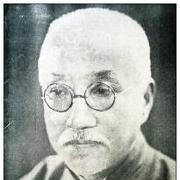When you think of Yenching University, you immediately think of educator John Leighton Stuart. As for Wu Leichuan, the university’s first Chinese president, many people don’t know about him.
Wu Leichuan, known as L. C. Wu in the West, was born in 1870. His real name was Wu Zhenchun. Wu was bright and fond of studying when he was young. At the age of 17, he passed the imperial examination at the county level in the Qing Dynasty. At the age of 28, he became a successful candidate in the highest imperial examinations and became editor of the Imperial Academy of Qing Dynasty. Wu Leichuan, however, happened to catch the Hundred Days’ Reform in 1898. This influential and groundbreaking reform deeply influenced the young Wu Leichuan, allowing him to broaden his horizon and become a scholar well versed in Chinese and Western culture.
In 1905, the Qing Dynasty abolished the imperial examinations and set up schools all over the country. As a member of the Imperial Academy, Wu Leichuan served as the supervisor of Zhejiang Advanced College (the predecessor of Zhejiang University), and contributed to the modernization of the school. Because of his excellent performance in running the school, he served as the mayor of Hangzhou for a short time after the Revolution of 1911.
After the founding of the Republic of China, Wu Leichuan’s thoughts changed greatly. He was baptized in 1915 and became a Christian. Because he had a strong foundation in studies of Chinese ancient civilization and had his own understanding of the Christian faith, he did not fully accept the teachings of western missionaries. Instead, he actively promoted the cause of Sinicization of Christianity in the Chinese cultural background.
At that time, China was enduring impoverishment and long-standing debility, and many people with lofty ideals were looking for ways to save the country. Under the influence of the social Gospel, Christian salvation for the nation became one of the prominent doctrines of the church at that time. Wu Leichuan had the goal of “improving their own practice, managing the family, governing the country, and pacifying the people of the world” held by the traditional Confucian scholars, and he soon accepted this trend of thought and integrated it with the Sinicization of Christianity. Wu’s book Christianity and Chinese Culture reflects his thoughts on the Sinicization of Christianity and the theory of national salvation. Although the book is controversial and even “immoral” in the eyes of conservative Christians, it is a valuable chapter in the history of Chinese theology. In addition, he devoted himself to the dialogue between Mencius’s thought and Christian faith, and his book Mo-tse and Jesus is a masterpiece.
In 1922, Wu entered Yenching University to teach Chinese. He became vice principal of the school in 1926. At that time, he was a famous teacher at Yenching University. He, Liu Tingfang and Zhao Zichen, two ancestors of the Chinese church, became the Three Masters of Yenching University.
At that time, the movement to reclaim the right to education was surging. In order to meet the needs of the times, many missionary schools transferred the management of the church from missionaries to Chinese believers. Mr Wu once pointed out the advantages of having a Chinese headmaster: “You can approach the authorities by speaking Chinese. When the authorities criticize you, foreigners do not need to feel embarrassed. The church should be open-minded and choose the right people as principals. In the absence of suitable candidates, the provisional organizing committee may preside over the affairs of the university, with the Chinese chairman and, of course, foreigners as committee members to participate in its deliberations and decisions.”
Stuart was also supportive of China’s efforts to reclaim the right to education.
In 1929, Wu became the first Chinese president of Yenching University. He formulated the school motto of “freedom through truth and service” and advocated the school spirit of democracy, unity, and upwardness. He hired many famous scholars of the time. Famous cultural figures such as Qian Xuantong, Zhou Zuoren, Shen Yinmo, Zheng Zhenduo, Xu Dishan, and Xie Bingxin had all become teachers of Yenching University. Although Lu Xun, Hu Shi, Wen Yiduo, and Zhu Ziqing were not teachers of Yenching University, they were also invited by Wu Leichuan to give lectures there.
Under the auspices of Wu Leichuan, Yenching University prospered in teaching and became the leading church-based university in China at that time.
In 1941 the war in the Pacific broke out and Yenching University lost its neutral role, and Stuart Leighton was put into a concentration camp by the Japanese. To use Wu Leichuan’s influence, the Japanese wanted him to work for them. But Wu Leichuan sternly refused. Wu Leichuan then shut himself up at home and soon died?? rested in grief and indignation.
Extended Reading: Diary of Wu Leichuan
This diary was written by L. C. Wu, the famous educator and president of Yenching University. It describes his academic life, work, and life at Yenching University for more than ten years. The diary covers a wide range of content, including notes and comments on philosophy, lectures, and preface & postscript about culture, as well as his daily exchanges with teachers and friends. Scholars such as Feng Youlan, Jiang Menglin, Guo Shaoyu, Xu Dishan, and Hong Ye often appear in the diary. This diary has important reference value for understanding Wu Leichuan’s life and thoughts, the history of Yenching University, and the educational ideas of universities of the Republic of China.
(The article is originally published by Gospel Times.)
- Translated by Nicolas Cao












